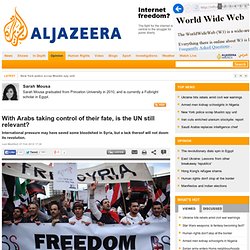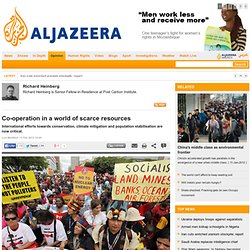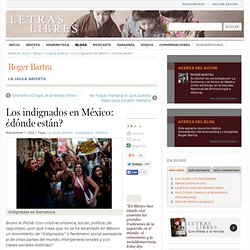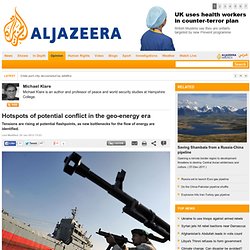

Drogas. Desarme. Primer Mundo - Tercer Mundo. I.
Introducción El concepto de Tercer Mundo tiene su origen en la situación de guerra fría que ha seguido la posguerra después de los acuerdos de Yalta. Dos mundos se oponían : el Oeste y el Este, representando de hecho dos sistemas económico-políticos, respectivamente el capitalismo (el Primer Mundo) y el socialismo (el Segundo Mundo). Cada uno era reagrupado alrededor de una superpotencia, los Estados Unidos y la Unión Soviética. Se calificó de Tercer Mundo, todo lo que se situaba en la periferia de los dos bloques.
Este «mundo» que a primera vista aparecía como al margen de los otros, era de hecho fundamentalmente concernido por la explotación de sus riquezas por el Primer Mundo y por un apoyo a los esfuerzos de liberación de parte del Segundo Mundo. II. Does the public blame banks for housing woes? - Behind the Numbers. Posted at 04:54 PM ET, 02/09/2012 Feb 09, 2012 09:54 PM EST TheWashingtonPost State and federal officials announced a $26 billion settlement penalizing banks for their role in the housing crisis, something that’s likely to cheer many Americans.

Most see banks as at least partly responsible for the nation’s housing woes, but polls show they are far from the only culprits. In a late 2010 Washington Post poll, more than four in 10 (45 percent) said they blame mortgage lenders for high foreclosure rates and people’s problems paying their monthly bills. See the full question wording here. There’s a partisan lens to the issue. Higher and lower income Americans also don’t see eye to eye on the issue. Americans have seen Obama’s performance on housing as worse than on other issues. More from the Post polling team. With Arabs taking control of their fate, is the UN still relevant? Cairo, Egypt - In a December interview with Barbara Walters, Syrian President Bashar al-Assad commented that the United Nations was not a credible institution, that it is just a "game" in which countries partake.

While "credible" may not be the most apt description, certainly not for the entirety of the UN, Assad's questioning of the sanctity of the institution is not as off-key as his political record. The recent rejection of a UN Security Council proposal to support the Arab League peace initiative for Syria due to Russian and Chinese veto is not as much of a nadir for the Syrian revolution as it is for the UN as an institution.
The UN Security Council stands as a relic of a past age; rather than voicing global concerns, it is a platform for permanent members to confirm the hierarchy of the world order. The United States has often used its power to veto resolutions associated with Israel. Arab revolutions Resource-wealthy Libya was readily targeted by NATO troops. Co-operation in a world of scarce resources. Santa Rosa, CA - From competition among hunter-gatherers for wild game to imperialist wars over precious minerals, resource wars have been fought throughout history; today, however, the competition appears set to enter a new - and perhaps unprecedented - phase.

As natural resources deplete, and as the earth's climate becomes less stable, the world's nations will likely compete ever more desperately for access to fossil fuels, minerals, agricultural land and water. Nations need increasing amounts of energy and materials to produce economic growth, but the costs of supplying new increments of energy and materials are burgeoning. In many cases, lower-quality resources with high extraction costs are all that remain. Securing access to these resources often requires military expenditures as well. Meanwhile, the struggle for the control of resources is realigning political power balances throughout the world.
Resource geopolitics The global geopolitical resource landscape. Los indignados en México: ¿dónde están? Indignadas en Barcelona Bruno H.

Piché: Con crisis económica, social, política, de seguridad, ¿por qué crees que no se ha levantado en México un movimiento de "indignados" o fenómeno social semejante al de otras partes del mundo, intergeneracionales y con clases sociales distintas? Roger Bartra: El movimiento de los indignados lleva claramente el sello del nuevo milenio. Es una ácida crítica a la sociedad moderna que contiene una carga moral poderosa. Hotspots of potential conflict in the geo-energy era. Amherst, Massachusetts - Welcome to an edgy world - where a single incident at an energy "chokepoint" could set a region aflame, provoking bloody encounters, boosting oil prices, and putting the global economy at risk.

With energy demand on the rise and sources of supply dwindling, we are, in fact, entering a new epoch - the Geo-Energy Era - in which disputes over vital resources will dominate world affairs. In 2012 and beyond, energy and conflict will be bound ever more tightly together, lending increasing importance to the key geographical flashpoints in our resource-constrained world. Take the Strait of Hormuz, already making headlines and shaking energy markets as 2012 begins. Connecting the Persian Gulf and the Indian Ocean, it lacks imposing geographical features like the Rock of Gibraltar or the Golden Gate Bridge. In an energy-conscious world, however, it may possess greater strategic significance than any passageway on the planet.
The Strait of Hormuz The South China Sea. _-_ Dr. Lorenzo Meyer _-_